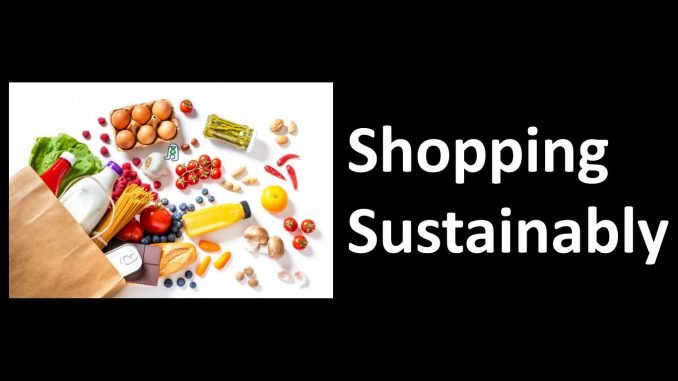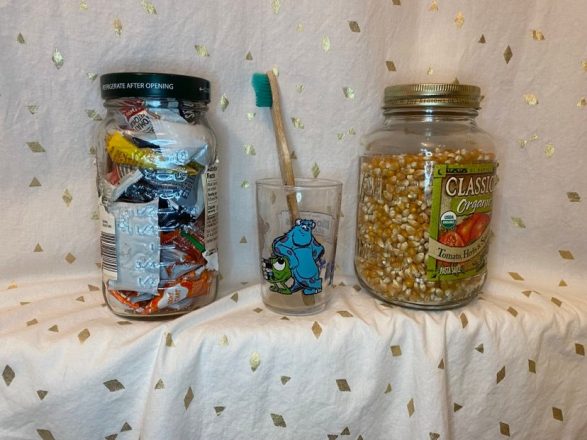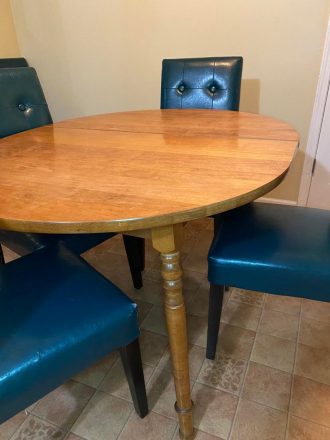
It is inevitable that you will have to buy things. Either groceries, or new shoes for your kid, at some point you will make your way into a store. When you do go shopping here are some considerations to help you make the most sustainable choices. Hopefully you will save some money as well!
Grocery Shopping
When going to the grocery store there are several steps we can make to insure we are making sustainable choices. Don’t forget your reusable bags!
Glass
Instead of purchasing items contained in plastic or metal, glass is highly desirable for recycling. Glass is often recycled within the United States limiting transportation to recycling centers. In the chance that glass ends up in oceans or streams it will eventually grind down into sand. Be careful to avoid plastics and metal packaging because only a portion of these materials are actually recycled. In 2018 China stopped accepting the bulk of the recyclables we had spent decades sending them previously. As a result, even our separated recycling is now ending up in landfills.

Additionally, glass containers can be reused within the home to hold other foods, or items. My tooth brush holder is from a mustard jar I bought in 2013. I also reuse glass jars when I make homemade butter, and to hold my sauce packets.
Buy local, Buy in Season
Supporting local businesses helps the local economy, and lowers your carbon footprint! Going to the farmer’s market near you insures you are purchasing the freshest produce and supports local farmers. These farms are located near your city, or town limiting the fuel used to bring the produce to you.
Buying in season produce is better for the environment because less energy is used in production. Looking for in season produce is something that can be done at the regular grocery store also. Know what is in season for when you go to the grocery store.
Similarly to buying local, go to the store to purchase or pick up what you need. While you can get items shipped to your house, extra fuel is needed to get an item to you that may be sitting on a shelf at Walmart.
Bulk
Costco and Sam’s Club are great places to purchase in bulk things you might not be able to find from local businesses, or from the farmer’s markets. While many of these products will usually come in plastic, by purchasing more, you are limiting how many containers are needed for lesser quantities. Buying in bulk can also help you save money overall.
Some items I like to buy in bulk when I go to Costco are: vitamins, chicken, and popping corn. I overall use less plastic because I get more product in similar sized containers to what I would get at the grocery store.
Everything Else
Different considerations are applied when looking to purchase clothing, accessories, furniture, décor, etc. Before you head off to The Home Goods Store or Old Navy lets consider:
Purchasing Second Hand

I have found so many fantastic shirts, shoes, and furniture items from thrift stores and Facebook Marketplace! I end up saving significantly more money than if I were to buy it new, and I keep items from ending up in landfills. People will sell or donate just about anything, so if you have time to watch the resale websites, and walk through the area’s thrift stores, you will eventually find the thing that you need.
In the same vein, instead of throwing something away, consider donating it, giving it to someone else, or trying to sell it yourself.

Fix What You Have
Things break, your favorite shirts rip, but that doesn’t mean you need to toss it. Taking the time to repair your items gives them longer lives, and doesn’t contribute to excess waste. If you don’t have the skills to repair and mend, find someone who does. You’ll be supporting local tradesmen and women with the work, and you won’t have to give up your favorite shirt and coffee table.





Be the first to comment